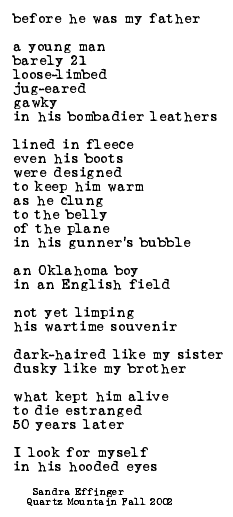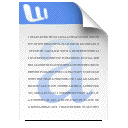 After my father’s death, I discovered a man that I
never knew. Going through his things, I found letters, medals,
photographs, a yearbook from his squadron, notes he had written
- and in reading through them, I could see him change from an
open young man, excited about his grand adventure, to the guarded
man who was my father - damaged and haunted by something he never
spoke about. And he was a “hero.” After my father’s death, I discovered a man that I
never knew. Going through his things, I found letters, medals,
photographs, a yearbook from his squadron, notes he had written
- and in reading through them, I could see him change from an
open young man, excited about his grand adventure, to the guarded
man who was my father - damaged and haunted by something he never
spoke about. And he was a “hero.”
 How much more troubling to confront “a difficult
past.” I do not expect this seminar to teach me about my
father -- that is a personal quest -- but I do have a profound
respect for how the past impacts the present, and for how imprecise
that past becomes, shifting as our subjective memories restructure
it. How much more troubling to confront “a difficult
past.” I do not expect this seminar to teach me about my
father -- that is a personal quest -- but I do have a profound
respect for how the past impacts the present, and for how imprecise
that past becomes, shifting as our subjective memories restructure
it.
 I am particularly intrigued by the way you plan to
expand “text” to incorporate physical context in our
study, Nora’s “places of memory” as you mention. In
2003, I participated in an NEH Seminar studying Dante in Siena
with Ron Herzman and Bill Stephany. I could never have recognized
how important context is without that experience. From the feel
of the thousand-year-old stones beneath my feet to the bitter
taste of vernaccia, sipped in the shade of San Gimignano's towers,
I understood the context of Dante in a way that cannot be duplicated
without the experience of place. At a much more basic level,
grocery shopping and doing laundry in a foreign language in a
foreign land was both humbling and empowering. I am particularly intrigued by the way you plan to
expand “text” to incorporate physical context in our
study, Nora’s “places of memory” as you mention. In
2003, I participated in an NEH Seminar studying Dante in Siena
with Ron Herzman and Bill Stephany. I could never have recognized
how important context is without that experience. From the feel
of the thousand-year-old stones beneath my feet to the bitter
taste of vernaccia, sipped in the shade of San Gimignano's towers,
I understood the context of Dante in a way that cannot be duplicated
without the experience of place. At a much more basic level,
grocery shopping and doing laundry in a foreign language in a
foreign land was both humbling and empowering.
 In Arthur Miller’s Incident at Vichy, Leduc's
powerful line expands place in an even more subjective sense:
“Your heart is conquered territory, mister.” Though
not a French view of the Vichy past, I have taught the play successfully,
finding that my students recognize why individuals may be complicit
with authority, choosing survival over some idealized nobility,
for all of us a painful fall from innocence. We sometimes find
ourselves by looking deeply at others. How might we have thought,
how might we have acted, in that situation? In Arthur Miller’s Incident at Vichy, Leduc's
powerful line expands place in an even more subjective sense:
“Your heart is conquered territory, mister.” Though
not a French view of the Vichy past, I have taught the play successfully,
finding that my students recognize why individuals may be complicit
with authority, choosing survival over some idealized nobility,
for all of us a painful fall from innocence. We sometimes find
ourselves by looking deeply at others. How might we have thought,
how might we have acted, in that situation?
 Miller’s play resonates with Nora's concept of “a
history in multiple voices.” Even having read only the preface
to Realms of Memory, I am fascinated by his term “rememoration,”
especially since my personal and cultural history seems to have
changed as I have aged. I doubt that my Sixties were much as
I remember them or as I have “cleaned them up” for
my students. Miller’s play resonates with Nora's concept of “a
history in multiple voices.” Even having read only the preface
to Realms of Memory, I am fascinated by his term “rememoration,”
especially since my personal and cultural history seems to have
changed as I have aged. I doubt that my Sixties were much as
I remember them or as I have “cleaned them up” for
my students.
 The main reason I want to be a participant in this
seminar is because of the challenging material. I am unfamiliar
with most of the texts you have selected, but I am an eager learner.
I have some familiarity with two of the films you have selected,
The Sorrow and the Pity and Au revoir les enfants.
It has been some years since I studied them in a film class,
so the emphasis was different. I have been fortunate enough to
teach a film elective for some years and look forward to once
again being a student of film. The main reason I want to be a participant in this
seminar is because of the challenging material. I am unfamiliar
with most of the texts you have selected, but I am an eager learner.
I have some familiarity with two of the films you have selected,
The Sorrow and the Pity and Au revoir les enfants.
It has been some years since I studied them in a film class,
so the emphasis was different. I have been fortunate enough to
teach a film elective for some years and look forward to once
again being a student of film.
 The very best teachers in the country will be applying
for this seminar, and those you select will be stimulating company.
The six weeks I spent studying Dante was the richest intellectual
experience I have ever had, and I am hungry for another like
it. After nearly thirty years in the classroom, I was bored and
uninspired. The usual sort of in-service was not enough. When
I say that the seminar experience changed my life, I do not exaggerate.
The classroom discussions were electric, exhilarating. I have
never been immersed in a group of people of such caliber. They
were knowledgeable, insightful, gifted, thoughtful, and we were
embarking on an intellectual journey of discovery together. Each
person brought something to that discussion which enriched all
of us. The very best teachers in the country will be applying
for this seminar, and those you select will be stimulating company.
The six weeks I spent studying Dante was the richest intellectual
experience I have ever had, and I am hungry for another like
it. After nearly thirty years in the classroom, I was bored and
uninspired. The usual sort of in-service was not enough. When
I say that the seminar experience changed my life, I do not exaggerate.
The classroom discussions were electric, exhilarating. I have
never been immersed in a group of people of such caliber. They
were knowledgeable, insightful, gifted, thoughtful, and we were
embarking on an intellectual journey of discovery together. Each
person brought something to that discussion which enriched all
of us.
 I am a good teacher because I have been fortunate
to work with colleagues who are better, who inspire me to be
better, who stimulate each other, who share, and who have helped
me enjoy teaching for almost every one of the thirty years I
have been in the classroom. Teaching renews me only as long as
I keep learning. I am a good teacher because I have been fortunate
to work with colleagues who are better, who inspire me to be
better, who stimulate each other, who share, and who have helped
me enjoy teaching for almost every one of the thirty years I
have been in the classroom. Teaching renews me only as long as
I keep learning.
 You also asked that we address our knowledge of French.
I studied French in high school and presented it as my language
for both my Bachelor's and my Master’s. That said, I read French
better than I hear it, and, according to a former French foreign
exchange student, I speak it with an accent that is “étrange.”
It will be a challenge for me to communicate effectively in French,
but, if accepted, I will pull out the old textbooks and load
the language CDs into the car so that I can immerse myself in
the culture. Scary, but exciting. You also asked that we address our knowledge of French.
I studied French in high school and presented it as my language
for both my Bachelor's and my Master’s. That said, I read French
better than I hear it, and, according to a former French foreign
exchange student, I speak it with an accent that is “étrange.”
It will be a challenge for me to communicate effectively in French,
but, if accepted, I will pull out the old textbooks and load
the language CDs into the car so that I can immerse myself in
the culture. Scary, but exciting.
 To show my gratitude to the National Endowment for
the Humanities, I promised myself that every year I would encourage
other teachers to take advantage of this life-changing opportunity.
Now that three years have passed, this was my opportunity to
apply again and I was immediately drawn to this seminar, personally
and intellectually. Your qualifications to teach me are evident,
and I hope I can convince you that I am worthy of instruction. To show my gratitude to the National Endowment for
the Humanities, I promised myself that every year I would encourage
other teachers to take advantage of this life-changing opportunity.
Now that three years have passed, this was my opportunity to
apply again and I was immediately drawn to this seminar, personally
and intellectually. Your qualifications to teach me are evident,
and I hope I can convince you that I am worthy of instruction.
 World War II casts its shadow into our present and
into our lives, in unexpected and troublesome ways. My father’s
inability to come to terms with his own “dark years”
cast its shadow over all his relationships, over his sense of
self. In your seminar description, many of the phrases that you
used to describe the French difficulty in confronting the legacy
of those four years fit my father's personal demons. World War II casts its shadow into our present and
into our lives, in unexpected and troublesome ways. My father’s
inability to come to terms with his own “dark years”
cast its shadow over all his relationships, over his sense of
self. In your seminar description, many of the phrases that you
used to describe the French difficulty in confronting the legacy
of those four years fit my father's personal demons.
 Wounded in his B-17 ball turret, my father never spoke
of his injury; yet he always limped, rubbing his left leg, enduring
its constant throb, its tenderness, a ghost of pain. Old wounds
always ache. Wounded in his B-17 ball turret, my father never spoke
of his injury; yet he always limped, rubbing his left leg, enduring
its constant throb, its tenderness, a ghost of pain. Old wounds
always ache. |




